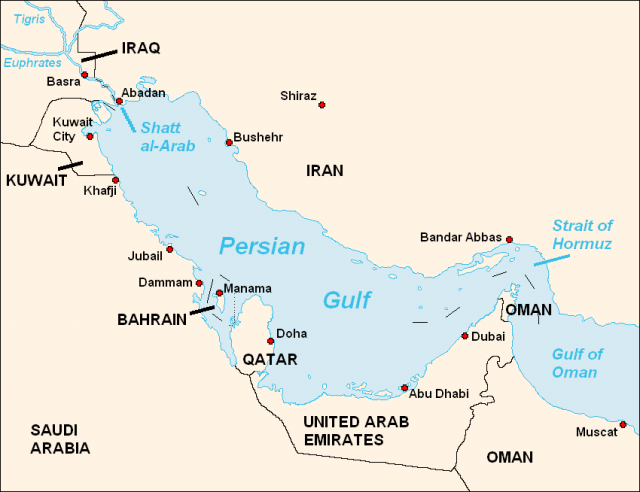International Relations
Persian Gulf Region
- 08 Jun 2020
- 7 min read
Why in News
The persian gulf region has the presence of the major producers of crude oil and natural gas, and thereby contributing critically to the global economy.
- Thus, maintaining peace in the geopolitically significant region through cooperative security by the regional members and major world economies is one of the best solutions to stabilize the region politically and economically.
Persian Gulf Region
- The lands around the Persian Gulf are shared by eight countries namely, Bahrain, Iran, Iraq, Kuwait, Oman, Qatar, Saudi Arabia, and the United Arab Emirates.
- These all eight countries are members of the United Nations.
- United Arab Emirates (UAE), Bahrain, Saudi Arabia, Oman, Qatar, Kuwait are members of the Gulf Cooperation Council (GCC).
- Out of persian gulf countries, Iran, Iraq, Kuwait, United Arab Emirates(UAE) and Saudi Arabia are members of OPEC.
- Being major producers of crude oil and natural gas, there is a commonality of interest among these countries.
- This commonality of interest has given rise to their own prosperity and subsequently, economico-political entanglements among them.
Background
- British Era:
- For eight decades prior to 1970, the persian gulf was guarded as a ‘British lake’.
- After the end of the British era, regional players entered with the intra-regional rivalries and forced cooperation.
- Aggravated Political Tensions in the Region:
- Events like the Muscat conference (1975), Iranian Revolution (1979) and the Iraq-Iran War (1980) aggravated the political tensions in the region. Subsequently, it enhanced USA’s interests and roles in the region.
- The Muscat Conference (1975) was intended to develop the unified army cooperation to enhance the security among gulf states to guarantee free navigation in the persian gulf.
- Later, the United Nations Security Council Resolution 598 (1987) was adopted to ensure a ceasefire between Iran and Iraq specifically and to explore measures to enhance the security and stability in the region generally.
- Events like the Muscat conference (1975), Iranian Revolution (1979) and the Iraq-Iran War (1980) aggravated the political tensions in the region. Subsequently, it enhanced USA’s interests and roles in the region.
Current Scenario
- Rising Conflicts in the Region:
- Recently, the geopolitical factors and conflicts in the West Asian region — Yemen, Syria, Libya — aggravated global and regional relationships.
- Declining Role of USA:
- The above mentioned conflicts have hampered USA-Iran relations that were to be premised on the multilateral agreement on Iran’s nuclear programme agreed to by western powers.
- The declining USA’s commitment to sub-regional security has raised more issues among the members of the Gulf Cooperation Council (GCC) due to political and ideological disagreement with Iran.
- Emerging Split Within GCC:
- The recent emergence of conflicting tactical and strategic interests and subjective considerations has created a division among the members of the GCC.
- These divisions in the GCC are being aggravated due to following reasons:
Possible Stability Framework for the Region
- Regional as well as Global Security:
- Any possible framework for stability and security in the region needs to ensure the security not only on the regional terms but also on global terms.
- Because the gulf regional security is not an issue among the Gulf States themselves but it is also an external issue.
- Other Aspects:
- Additionally, the framework will also need to ensure the following conditions which include:
- Peace and stability in individual littoral states.
- Freedom to all states of the Gulf littoral to exploit their hydrocarbon and other natural resources.
- Freedom of commercial shipping in international waters of the Persian Gulf.
- Freedom of access to, and outlet from, Gulf waters through the Strait of Hormuz.
- The prevention of conflict that may impinge on the freedom of trade and shipping.
- Additionally, the framework will also need to ensure the following conditions which include:
India’s Relation with Persian Gulf Region
- India and GCC:
- The economic and political relationship of India with the GCC has blossomed in recent years. The governments of the GCC members are India-friendly and Indian-friendly.
- The friendly relation has been reflected in the bilateral trade of around $121 billion and remittances of $49 billion from a workforce of over nine million.
- GCC suppliers account for around 34% of India’s crude imports.
- India and Iran:
- India has always shared a friendly relationship with Iran. But the India-Iran relation faces one of the most complex phases at all times due to the USA’s pressure which has politico-economic impacts.
- In May 2018, the USA abandoned the nuclear deal and reinstated economic sanctions against Iran.
- India has always shared a friendly relationship with Iran. But the India-Iran relation faces one of the most complex phases at all times due to the USA’s pressure which has politico-economic impacts.
- India's Overall Role in the Region:
- India has avoided involvement in local or regional disputes in the region.
- Indian interests do not entail power projection but necessitate peace and regional stability.
Way Forward
- It has been assessed that Saudi Arabia is a fading power whereas UAE, Qatar and Iran are emerging as the new regional leaders. Oman and Iraq will have to struggle to retain their sovereign identities.
- Thus, Indian interests would be best served if the stability in the region is ensured through cooperative security since the alternative, of competitive security options, cannot ensure durable peace.







